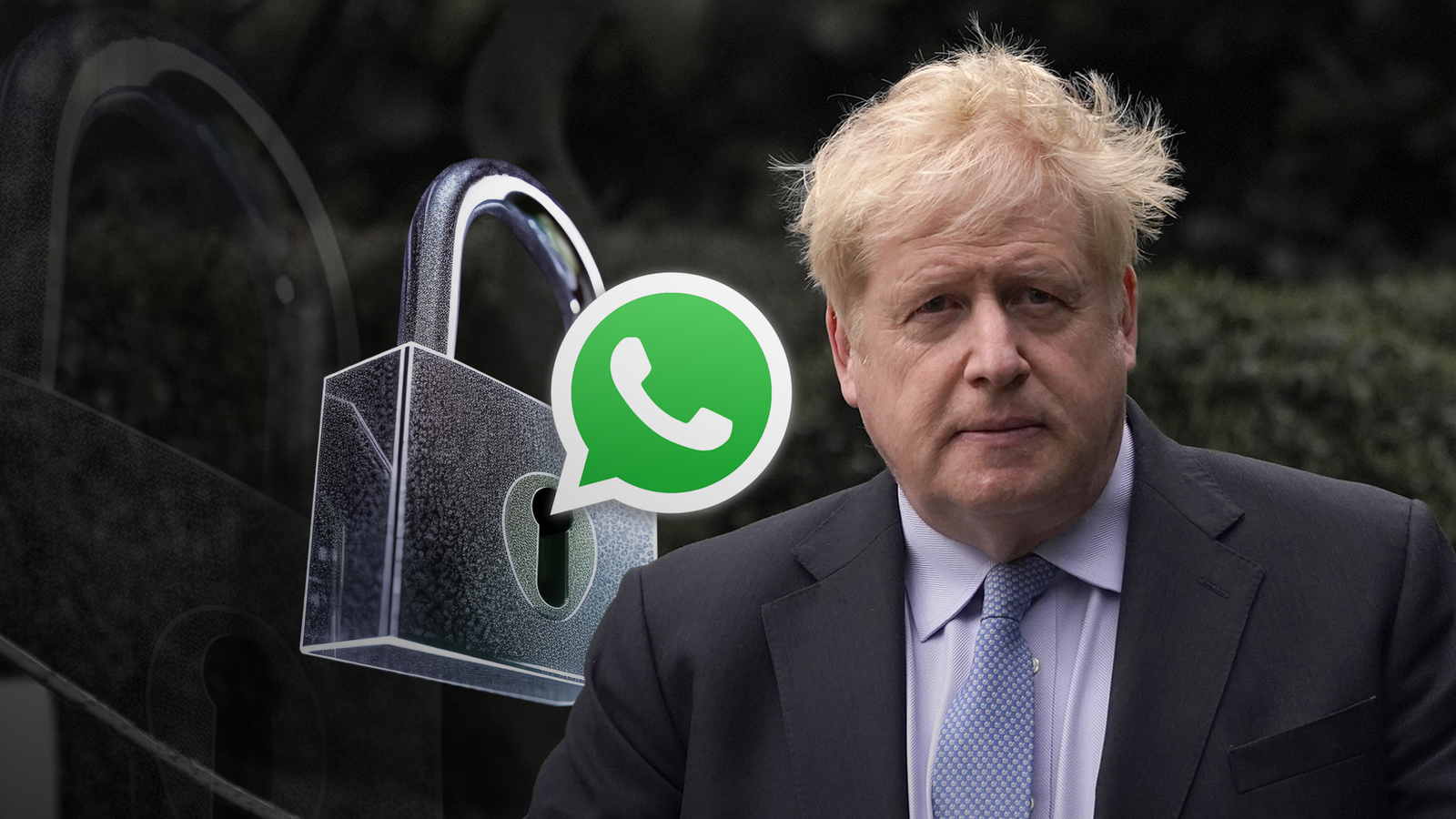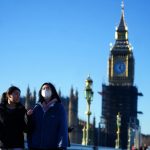Matt Hancock, who resigned as health secretary in the midst of the pandemic, and his memoir’s co-author Isabel Oakeshott, who subsequently handed over confidential information he gave her to The Daily Telegraph, have both come under heavy public criticism.
But they also performed one important public service by revealing the central role played by WhatsApp for communications between ministers and others during the crisis.
The cache of over 100,000 messages – more than two million words’ worth – which Mr Hancock downloaded from his phone and gave to Ms Oakeshott, provided the substance for their self-justifying book Pandemic Diaries and for the revelations in The Telegraph’s Lockdown Files reporting.
Thanks to Ms Oakeshott’s betrayal, the Hancock messages are effectively in the public domain.
Please use Chrome browser for a more accessible video player
So what about all the other informal communications in 2020, 2021 and 2022 inside government during COVID-19? Surely they should be gathered in the evidence for Baroness Hallet’s official UK COVID-19 Inquiry, which will start hearings in a few weeks’ time?
Lady Hallet has already assured “the bereaved that this inquiry is in the process of obtaining all relevant WhatsApp messages from all relevant groups, not just those from Mr Hancock”.
The government must be regretting giving Heather Hallet, a retired justice of appeal, such a wide-ranging remit for her inquiry. Alongside other vital matters such as how the health services dealt with patients and the pandemic, she is instructed to examine “how decisions were made, communicated, recorded, and implemented” in “the public health response across the UK.”
This puts Boris Johnson, his ministers and their advisers in her sights from the very start of the pandemic.
On Thursday, the government took the remarkable decision to take legal action against the inquiry it set up in an attempt to avoid handing over the unredacted emails of the then prime minister, Mr Johnson.
The bitter tussle over disclosure involves Lady Hallet, Mr Johnson, the courts, the Cabinet Office, and ultimately the current prime minister, Rishi Sunak.
Please use Chrome browser for a more accessible video player
Yet the nature of modern communication means whatever is handed over cannot give a full picture. Messaging by WhatsApp is an easy option for hard-pressed ministers and an invitation for ill-judged comments.
It also usually leaves a trail, if that can be accessed. WhatsApp messages can also be lost or deleted, or conducted in other conversations on undetected devices.
Lady Hallett is taking a tough line. She insists it is not up to the Cabinet Office to decide what internal government communications and messages, formal and informal, are relevant to her inquiry.
She wants to see everything: WhatsApp exchanges, emails, minutes, notes and diaries, “including the other (superficially unrelated) political matters they were concerned with at the time” – because it is possible a minister dealt with COVID matters “inadequately because he or she was focussing (perhaps inappropriately) on other issues.”
Be the first to get Breaking News
Install the Sky News app for free
Before modern digital communications, it was simpler to keep track of how official decisions were reached. Most of the discussions or ideas were written down by those involved or recorded by their aides. Even telephone calls on direct lines were listened into and minuted.
Of course, important off-the-record conversations took place. But there was a generally respected code of honour that politicians would stand by their word, under oath, if required.
Smartphones have changed all that. There is little trust in what those in government say or say they have said. Personal phones and email servers have made it easier to avoid official channels and to express views casually. It is easier to dash off a hasty text message than to write a memo or to have a formal conversation.
Many involved in politics have been attracted to WhatsApp in particular by its promise of confidentiality through “end-to-end encryption”. As a result, WhatsApp records are often at the centre of contemporary demands for evidence, including from the COVID-19 Inquiry.
Even emails are old hat. Only yesterday, one senior official asked me for another’s mobile number, so they could send them a WhatsApp complaining “they never answer my emails”. Do they even read them? Nobody actually answers a telephone call these days. Until 20 years ago, the work of a political reporter was carried out essentially at first hand, through conversations face to face or on the phone. Now most communications take place in text message form on phones, most of it on WhatsApp.
Please use Chrome browser for a more accessible video player
Paradoxically, as the Hancock files demonstrated, there is no privacy if WhatsApp trails can be accessed at either end. If an end-user’s phone can be opened, it is easy to recover an account of what was really said in chains of messages in numerous WhatsApp groups.
Many news stories in recent years have been based on what people have said to each other on WhatsApp. Hence, the contortions by former health minister Lord Bethell explaining why he had deleted or lost messages on his phones and the celebrated case of Rebekah Vardy’s agent’s phone dropping into the North Sea.
MPs are among those making increased use of the facility which automatically deletes messages after a set time. This is a genuine threat to ever being able to assemble a proper record in an inquiry. A bid to ban the practice of message self-destruction by ministers failed in the UK courts.
The government’s proposal to legislate against encryption in the Online Safety Bill has no bearing on disclosures through end users. It would allow security services to scrutinise messages without the knowledge of those communicating. WhatsApp says it would rather shut down in the UK than hand such power to the authorities. Its parent company Meta has floated extending encryption to Facebook and Instagram.
In its advice on data handling for doctors, the British Medical Association noted that international or US based companies, such as Meta, can never be fully subject to UK law.
A year ago, the Institute for Government blamed WhatsApp for poor decisions based on incomplete information, for making record keeping more difficult and for undermining accountability and transparency. Regulators and watchdog organisations accept however that it is impractical to disinvent, or completely ban the use of, personal phones and email accounts and WhatsApp.
In the wake of Mr Hancock’s resignation, the UK Information Commission Office issued “a reprimand” to the Department of Health (DHSC) for insufficient data protection. Commissioner John Edwards is leading calls for stronger guardrails to be put in place.
Please use Chrome browser for a more accessible video player
Civil servants have been issued with a colour code on the use NCCCs (non-corporate communications channels). It is in the red zone to use personal devices or emails for “secret” or “top secret” information. As so often in this country, rules for civil servants are merely guidelines for elected politicians. Disciplining ministers is subject to the whim of the prime minister.
That explains why Mr Johnson passed his records back to the Cabinet Office rather than directly to the COVID-19 Inquiry, gift-wrapped with the unhelpful suggestion to “urgently disclose” them. In practice, Mr Johnson put that tricky decision, and the controversial legal bid to protect his WhatsApp privacy, back in the hands of his rival Rishi Sunak.
In launching its appeal this week, the Cabinet Office revealed that it had only seen Mr Johnson’s WhatsApp messages from May 2021, 18 months after the pandemic began. Prior to that, he used a different personal phone which he has not made available, raising questions over how frank he intends to be.
Mr Hancock and Ms Oakeshott are not the only ones who think that official information, of interest to the public, is something to be manipulated for their own ends. WhatsApp is a powerful tool, but the trails of information it leaves behind do not tell the whole truth.






















